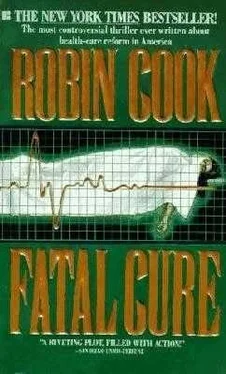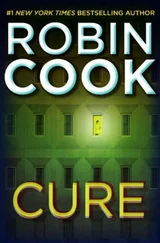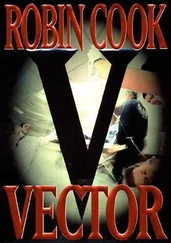"Pleasure," Calhoun said when he shook hands with David.
They sat in the living room on the shabby old furniture that they'd brought from Boston. The huge room had a cheap dance-hall feel with such meager, pitiful furnishing. The plastic bag taped to the window didn't help.
"Nice house," Calhoun said as he looked around.
"We're still in the process of furnishing it," Angela said. She asked if she could get Calhoun something to drink. He said he'd appreciate a beer if she didn't mind.
While Angela was off getting the beer, David continued to eye their visitor. Calhoun was older than David had expected. A shock of gray hair bristled' from beneath the red cap, which Calhoun made no attempt to remove.
"Mind if I smoke?" Calhoun asked as he brandished his Antonio y Cleopatras.
"I'm sorry, but we do," Angela said, coming back into the room and handing Calhoun his beer. "Our daughter has respiratory problems."
"No problem," Calhoun said agreeably. "I wanted to give you folks an update on my investigations. It's proceeding well, although not without effort. Dr. Dennis Hodges was not the most popular man in town. In fact, half the population seems to have hated him for one reason or another."
"We're already aware of that," David said. "I hope that you have more specific details to add to justify your hourly wage."
"David, please!" Angela said. She was surprised at David's rudeness.
"It's my opinion," Calhoun continued, ignoring David's comment, "that Dr. Hodges either didn't care what other people thought of him or he was socially handicapped. As a purebred New Englander, it was probably a combination of the two." Calhoun chuckled, then took a drink of his beer.
"I've made up a list of potential suspects," Calhoun continued, "but I haven't interviewed them all yet. But it's getting interesting. Something strange is going on here. I can feel it in my bones."
"Who have you spoken with?" David asked. There was still a rudeness to his voice that bothered Angela, but she didn't say anything.
"Just a couple so far," Calhoun said. He let out a belch. He made no attempt to excuse himself or even cover his mouth. David glanced at Angela. Angela pretended not to have noticed.
"I've talked to a few of the higher-ups with the hospital," Calhoun continued. "The chairman of the board, Traynor, and the vice chairman, Sherwood. Both had reasons to hold a grudge against Hodges."
"I hope you plan to speak with Dr. Cantor," Angela said. "I'd heard he really had it out for Hodges."
"Cantor's on the list," Calhoun assured her. "But I wanted to start at the top and work down. Sherwood's grudge involved a piece of land. Traynor's beef was far more personal."
Calhoun went on to explain the Traynor-Hodges-Van Slyke triangle, concluding with the suicide of Sunny Traynor, Traynor's sister.
"What a terrible story," Angela said.
"It's like a TV melodrama," Calhoun agreed. "But you'd think that if Traynor felt compelled to do anything about Hodges, he would have done it back then, not now. Besides, Hodges had hand-picked Traynor to take over the hospital board well after the suicide. I doubt he'd have done that if he and Traynor were still at odds. And Van Slyke's child, Werner, works for the hospital today."
"Werner Van Slyke is related to Traynor?" David questioned with surprise. "Now that smacks of nepotism."
"Could be," Calhoun said. "But Werner Van Slyke, Junior, had a long-term friendly relationship with Hodges. He'd taken care of this house for Hodges for years. His position at the hospital is probably more a result of Hodges' doing than Traynor's. At any rate, I don't suspect Traynor of murder."
"How can you be sure?" Angela questioned.
"Can't be sure of anything except Hodges' murder," Calhoun said. "After that we can only deal in probabilities."
"This is all very interesting," David said, "but have you come up with a suspect or at least narrowed the list down?"
"No, not yet," Calhoun said.
"How much have we spent to get to this dubious crossroad?" David asked.
"David!" Angela snapped. "I think you're being unfair. I think Mr. Calhoun has learned a lot in a short period of time. I think the important question now is whether he believes the case is solvable."
"I'll buy that," David said. "What's your professional assessment, Mr. Calhoun?"
"I think I need a cigar," Calhoun said. "Would you folks mind if we were to sit outside?"
A few minutes later they assembled on the terrace. Calhoun was utterly content with his smoke and another beer.
"I think the case is definitely solvable," he said. His broad, doughy face intermittently lit up as he puffed on his cigar. "You have to know something about small New England towns: they are more the same than they are different. I know these people and I understand the dynamics. The characters are generally the same from town to town, only the names are different. Anybody's business is everybody else's. In other words I'm sure that some people know who the killer is. The problem is getting somebody to talk. My hunch is that the hospital is involved on some level, and no one wants it to get hurt. And there's a chance it could get hurt because Hodges made the hospital his life's work."
"How have you gotten your information so far?" Angela asked. "I thought New Englanders were closed-mouthed, reluctant to talk."
"Generally true," Calhoun said. "But some of the best people for town gossip happen to be friends of mine: the bookstore owner, the pharmacist, the bartender, and the librarian. They've been my sources so far. Now, I just have to start eliminating suspects. But before I begin I have to ask you a question: Do you want me to continue?"
"No," David said.
"Wait a minute," Angela said. "You've told us that the case is definitely solvable. How long do you think it will take?"
"Not too long," Calhoun said.
"That's too vague," David said.
Calhoun lifted his cap and scratched his scalp. "I'd say within a week," he said.
"That's a lot of money," David said.
"I think it's worth it," Angela said.
"Angela!" David pleaded. "You told me you were going to drop this Hodges affair."
"I will," Angela said. "I'll let Mr. Calhoun do everything. I won't talk to a soul."
"Good Lord," David said dejectedly as he rolled his eyes in exasperation.
"Come on, David," Angela said. "If you expect me to live in this house then you have to support me in this."
David hesitated, then thought of a compromise. "Okay," he said. "I'll make a deal. One week, then it's over no matter what."
"All right," Angela said. "It's a deal." Then she turned to Calhoun. "Now that we have a time constraint, what's the next move?"
"First I'll continue interviewing my list of suspects," Calhoun said. "At the same time there are two other major goals. One is to reconstruct Dr. Hodges' last day, assuming he was killed on the day he disappeared. To do this I want to interview Hodges' secretary-nurse who'd worked for him for thirty-five years. The second goal is to get copies of the medical papers that were found with Hodges."
"They're in the custody of the state police," Angela said. "Having been on the force, can't you get copies easily?"
"Unfortunately, no," Calhoun said. "The state police tend to be inordinately guarded when it conies to evidence in their custody. I know because I used to work for a while in the crime-scene division up in Burlington. It makes for a kind of 'catch-22.' The state police with the expertise and the evidence aren't motivated to expend a lot of time and effort on this kind of case because they take their cue from the local police. If the local police don't care, then the state police let it slide. One of the reasons the local police don't care is they don't have the evidence to go on."
Читать дальше












